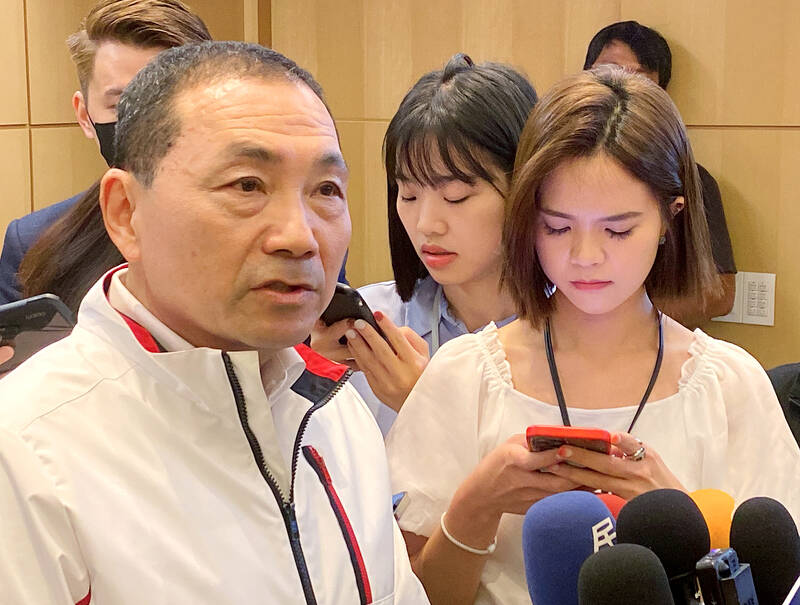The Democratic Progressive Party (DPP) and New Taipei City Mayor Hou You-yi (侯友宜) yesterday clashed over energy policy after Hou reiterated that he would back the utilization of nuclear power plants if elected president.
Hou is the Chinese Nationalist Party’s (KMT) candidate in next year’s presidential election.
Taiwan might not have enough electricity reserves to ensure a stable power supply for the nation’s chipmakers to retain their competitive edge, Hou told a news conference after a meeting at city hall.

Photo: CNA
The DPP government’s plan to phase out nuclear power by 2025 is unrealistic and switching to gas-fired power plants would harm the environment, Hou said, adding that a mix of nuclear and renewable power should be the way forward.
DPP spokesman Chang Chih-hao (張志豪) said Hou should back his claims with evidence or “be exposed as the ignoramus in national policy and energy issues that he truly is.”
The KMT has for years made baseless allegations that Taiwan has an inadequate energy supply, but it was in 2016, the last year of Ma Ying-jeou’s (馬英九) presidency, when the nation’s operating reserves fell to a nadir of 1.64 percent, Chang said.
Ma of the KMT approved the construction of fewer power plants than any president before or since, he said, adding that Hou, then-deputy mayor of New Taipei City, did not voice any concerns about energy supply.
Over the past five years, Taiwan Power Co (Taipower) issued only five orange and one red alert for low operating reserves, he said.
President Tsai Ing-wen (蔡英文) has approved the construction of gas-fired plants that would increase the nation’s energy production by 91,000 kilowatts per hour (kWh), or triple the combined output of the Jinshan Nuclear Power Plant in New Taipei City’s Shihmen District (石門) and the Guosheng Nuclear Power Plant in New Taipei City’s Wanli District (萬里), Chang said.
Taiwan would not have an energy shortage as long as it continues to invest in energy storage technology and power grid resiliency, he said.
Taiwan is to generate 30,000 kWh of renewable electricity by 2030 as per the RE100 initiative, to which Taiwan Semiconductor Manufacturing Co (TSMC) and the nation’s top enterprises have pledged themselves, Chang said.
The initiative’s definition of renewables does not include nuclear power, he said, adding that Hou does not understand the needs of industry or Taiwan’s international obligations.
Hou’s latest remarks are part of his pattern of taking credit for positive achievements, while pinning the blame for all negative developments on the central government, said Chen Shih-kai (陳世凱), spokesperson for Vice President William Lai’s (賴清德) presidential campaign.
The New Taipei City Government has sued Taipower multiple times over the past 10 years to prevent the storage of radioactive waste from nuclear power plants in its jurisdiction, he said.
Hou must explain to voters how he would deal with the issue of nuclear waste if elected, Chang said.
“Hou cannot push for nuclear power on the one hand and give empty platitudes [about storage] on the other,” he said.

Chinese Nationalist Party (KMT) Chairman Eric Chu (朱立倫), spokeswoman Yang Chih-yu (楊智伃) and Legislator Hsieh Lung-chieh (謝龍介) would be summoned by police for questioning for leading an illegal assembly on Thursday evening last week, Minister of the Interior Liu Shyh-fang (劉世芳) said today. The three KMT officials led an assembly outside the Taipei City Prosecutors’ Office, a restricted area where public assembly is not allowed, protesting the questioning of several KMT staff and searches of KMT headquarters and offices in a recall petition forgery case. Chu, Yang and Hsieh are all suspected of contravening the Assembly and Parade Act (集會遊行法) by holding

PRAISE: Japanese visitor Takashi Kubota said the Taiwanese temple architecture images showcased in the AI Art Gallery were the most impressive displays he saw Taiwan does not have an official pavilion at the World Expo in Osaka, Japan, because of its diplomatic predicament, but the government-backed Tech World pavilion is drawing interest with its unique recreations of works by Taiwanese artists. The pavilion features an artificial intelligence (AI)-based art gallery showcasing works of famous Taiwanese artists from the Japanese colonial period using innovative technologies. Among its main simulated displays are Eastern gouache paintings by Chen Chin (陳進), Lin Yu-shan (林玉山) and Kuo Hsueh-hu (郭雪湖), who were the three young Taiwanese painters selected for the East Asian Painting exhibition in 1927. Gouache is a water-based

Taiwan would welcome the return of Honduras as a diplomatic ally if its next president decides to make such a move, Minister of Foreign Affairs Lin Chia-lung (林佳龍) said yesterday. “Of course, we would welcome Honduras if they want to restore diplomatic ties with Taiwan after their elections,” Lin said at a meeting of the legislature’s Foreign Affairs and National Defense Committee, when asked to comment on statements made by two of the three Honduran presidential candidates during the presidential campaign in the Central American country. Taiwan is paying close attention to the region as a whole in the wake of a

OFF-TARGET: More than 30,000 participants were expected to take part in the Games next month, but only 6,550 foreign and 19,400 Taiwanese athletes have registered Taipei city councilors yesterday blasted the organizers of next month’s World Masters Games over sudden timetable and venue changes, which they said have caused thousands of participants to back out of the international sporting event, among other organizational issues. They also cited visa delays and political interference by China as reasons many foreign athletes are requesting refunds for the event, to be held from May 17 to 30. Jointly organized by the Taipei and New Taipei City governments, the games have been rocked by numerous controversies since preparations began in 2020. Taipei City Councilor Lin Yen-feng (林延鳳) said yesterday that new measures by